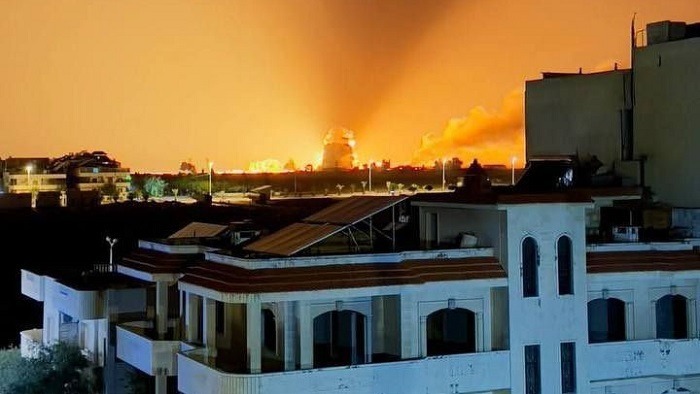The UN Security Council will hold an emergency meeting on Thursday morning to discuss the ongoing Israeli attacks against Syria. Among the topics expected to be discussed are the April 2 attack in Daraa Governorate, which killed 11 civilians and wounded a number of others.
Since the ouster of the Assad government in December, Israel has carried out hundreds of attacks across Syria, mostly targeting former military infrastructure in the north, but in the south, those strikes are being done to facilitate an ongoing invasion and occupation of parts of the Daraa and Quneitra Govenrorates.
The UN Security Council meeting was called by Algeria and Somalia, who are two of the 10 non-permanent members at present. Algeria and Somalia are members of the Group A3+ organization, which seeks to coordinate action on issues of international import.

On April 2, Israel attacked the Syrian town of Nawa, killing several with airstrikes and artillery fire
It’s not clear whether any specific resolutions are to be taken up at the meeting, and reports now are just that the meeting is meant to discuss the repercussions of the continued Israeli attacks and the question of Syrian sovereignty.
Sovereignty, interestingly, is a major focus of Israeli Ambassador to the UN Danny Danon, who insisted that Israel has every right to attack Syria, and a failure of the UN Security Council to recognize that right undermines Israeli sovereignty and threatens the region.
Danon presented Israeli attacks in the north as “defensive” to protect Israeli citizens against the military that no longer exists, and its invasion and occupation of the south as meant to create a “defensive barrier” to stabilize the region.
Israel was on extremely hostile terms with the Assad government, and while the Islamist Hayat Tahrir al-Sham (HTS), the current Syrian government, initially offered rapprochement, Israel has presented them as every bit as dangerous an enemy, at least in the context of seizing land in the south.
There was already a buffer zone between Israel and Syria before the latest invasion, the UNDOF demilitarized zone established between the Israeli-occupied Golan Heights and the rest of Syria. Israel has occupied much of the UNDOF zone, and gone further in many cases to attack towns and villages even deeper into Syria.
Analysts see Israel’s constant attacks on Syria and Lebanon as designed to keep both nations in a relatively weak position, a way they believe will ultimately ensure they remain the stronger power.


